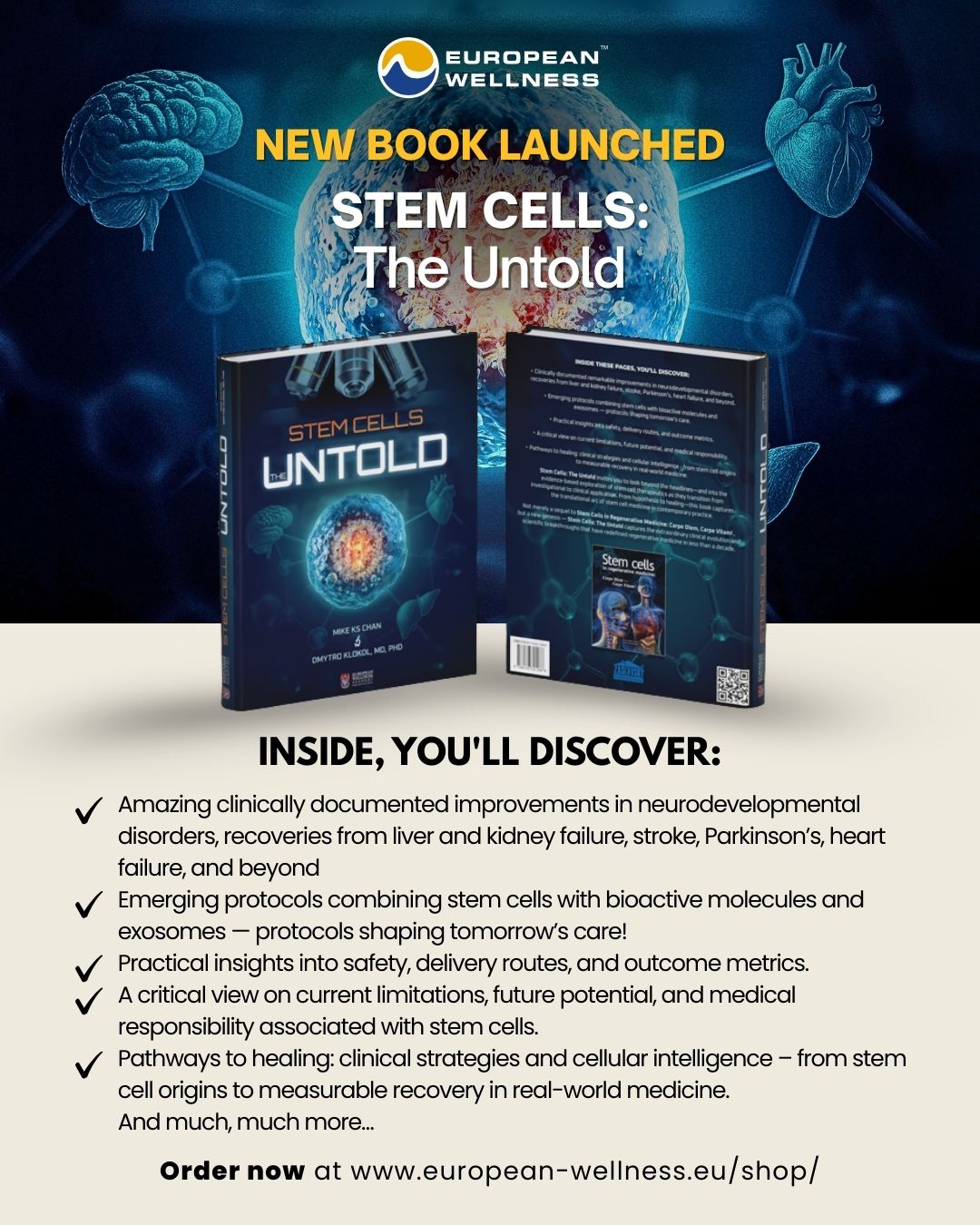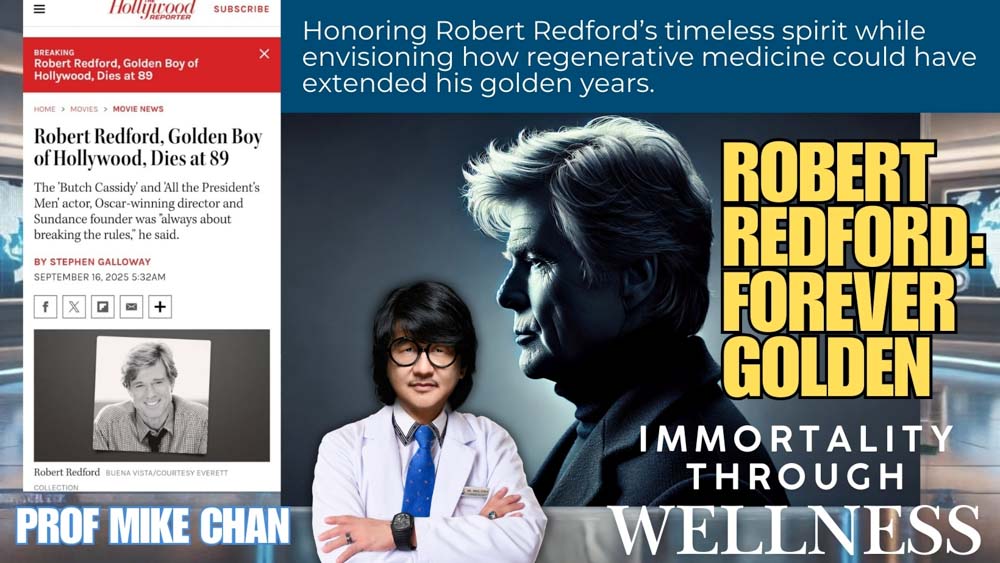What if the future of modern healing is already here… just untold? We’re excited to…
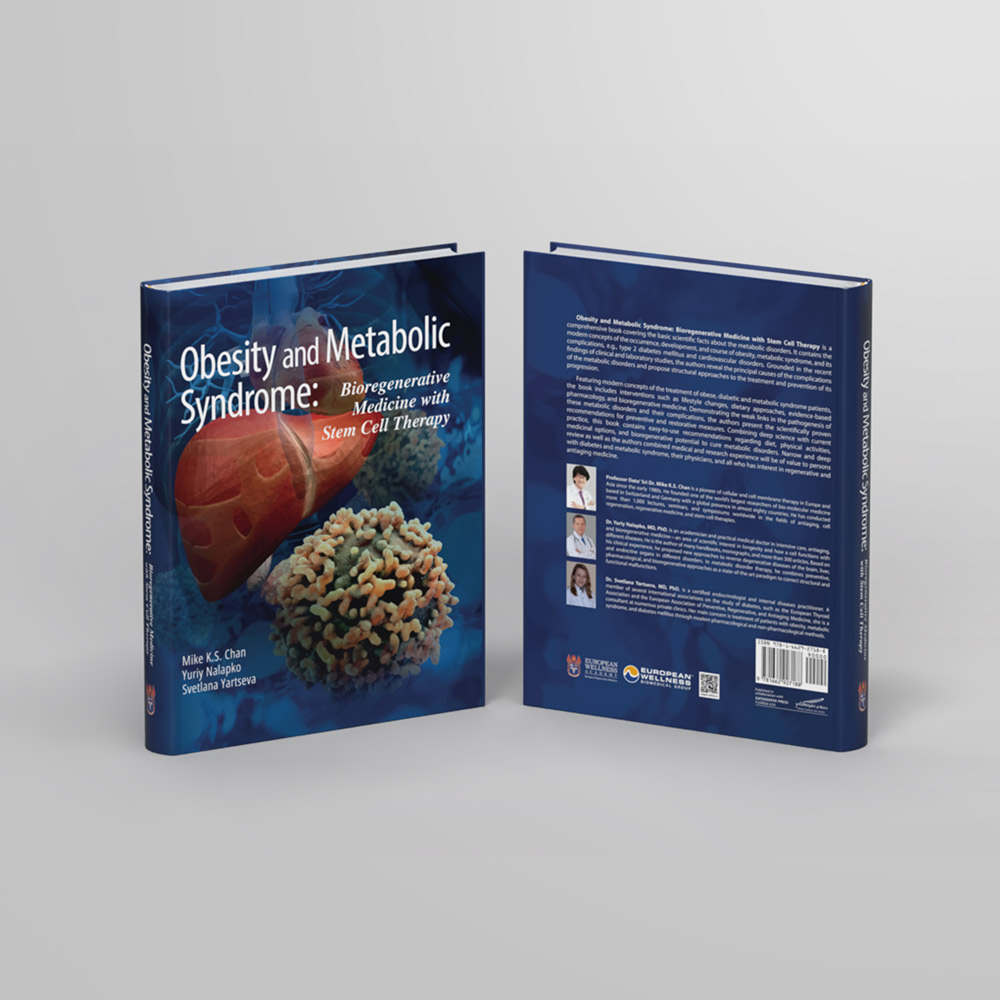
Discovering a Healthier You: Prof. Mike Chan’s Guide to Understanding and Managing Your Weight
The Battle Against the Bulge: A Modern Epidemic
It feels like a never-ending battle, doesn’t it? That extra slice of cake, the sugary drinks we can’t resist, and the comfortable couch that calls our name after a long day. Before we know it, the numbers on the scale start creeping up. This isn’t just a personal struggle; it’s a global one affecting over 1.9 billion adults worldwide. Prof. Mike Chan, a Malaysian scientist who has been at the forefront of cellular therapy since the early 1980s, has dedicated his life to helping people understand and conquer this challenge. Having traveled around the world treating celebrities, heads of state, sports athletes, and highly influential net-worth individuals, Prof. Chan brings decades of real-world experience to his latest work.
In his comprehensive new book, “Obesity and Metabolic Syndrome: Bioregenerative Medicine with Stem Cell Therapy,” Prof. Chan breaks down the complexities of weight gain into simple, understandable concepts. Think of Prof. Chan as a translator who takes complicated medical jargon and turns it into everyday language that anyone can understand. Just like how a good teacher can explain rocket science to a child using simple examples, Prof. Chan makes the science of weight management accessible to everyone.
Imagine your body is like a car. To run smoothly, it needs the right amount and type of fuel. If you put in too much fuel, or the wrong kind, the car’s engine will start having problems. Similarly, when we eat more calories than our body needs, or consume unhealthy foods, our body’s ‘engine’ – our metabolism – gets disrupted. This is what Prof. Chan explains as the root cause of obesity. It’s not just about looking good; it’s about feeling good from the inside out. As Prof. Chan says, “Obesity is an independent risk factor of diseases and clinical disorders, including all-cause mortality, coronary and cerebrovascular diseases, metabolic syndrome, type 2 diabetes mellitus, hypertension, liver disease, and cancers.” This means that carrying extra weight can lead to a whole host of other health problems, making the journey of life much shorter and more difficult.
Your Body’s Report Card & Understanding the Numbers
So, how do you know if you’re in the healthy range? Prof. Chan explains a simple tool called the Body Mass Index, or BMI. Think of it as a report card for your body. It’s a simple calculation using your height and weight – just like how you might calculate how many apples you can fit in a basket based on the size of the basket and the size of the apples. According to Prof. Chan, a healthy BMI is between 18.5 and 24.9. Anything above 25 is considered overweight, and above 30 is obesity.
But here’s where Prof. Chan’s expertise really shines. He doesn’t just give you numbers; he explains what they mean for your daily life. For example, if you’re 5’6″ tall, a healthy weight would be between 115 and 154 pounds. If you weigh 180 pounds, you’d be in the overweight category. But Prof. Chan also emphasizes that BMI is not the only measure. He says, “Body mass index correlates with the risk of comorbidities. BMI > 25 corresponds to overweight, and BMI >30 corresponds to obesity.”
This means that while BMI is a good starting point, it’s also important to consider other factors like your waist circumference. Prof. Chan explains that where you carry your weight matters too. Imagine two people with the same BMI – one carries extra weight around their waist (like an apple shape), while the other carries it in their hips and thighs (like a pear shape). The person with the apple shape is at higher risk for health problems. Just like a student’s report card doesn’t tell the whole story about their intelligence, BMI doesn’t tell the whole story about your health. It’s a guide, a tool to help you understand where you stand.
A New Path to Wellness With Prof. Mike Chan’s Solutions
Now for the good news! Prof. Chan doesn’t just explain the problem; he offers real, practical solutions. Drawing from his decades of experience treating high-profile clients worldwide, he believes in a holistic approach that combines lifestyle changes with cutting-edge bioregenerative medicine. Think of it like this: if your car’s engine is sputtering, you don’t just keep driving it. You take it to a mechanic who can fix the engine and also teach you how to maintain it better. Prof. Chan’s approach is similar – he fixes the immediate problem while teaching you how to prevent it from happening again.
Prof. Chan’s book outlines several specific solutions. First, he emphasizes lifestyle modifications that are simple enough for anyone to follow. This includes eating regular meals (imagine your metabolism as a fire that needs consistent fuel to keep burning), getting adequate sleep (your body repairs itself while you sleep, like a construction crew working overnight), and managing stress (chronic stress is like having your car’s alarm constantly going off – it drains the battery).
For physical activity, Prof. Chan doesn’t expect you to become a marathon runner overnight. Instead, he suggests starting small – like taking the stairs instead of the elevator, or parking farther away from the store entrance. It’s like learning to walk before you run. He also introduces innovative dietary approaches, including intermittent fasting and ketogenic diets, explaining them in simple terms that anyone can understand.
But here’s where Prof. Chan’s expertise truly sets him apart from other weight loss experts. He introduces cutting-edge bioregenerative therapies, including precursor stem cell therapy and mitochondrial therapy. Think of stem cells as your body’s repair crew – they can transform into different types of cells to fix damaged tissues. Prof. Chan explains how these therapies can help repair the damage caused by obesity and metabolic syndrome, helping your body heal itself from the inside out, restoring its natural balance.
Prof. Chan also discusses organotherapy, which uses specific organ extracts to support the function of corresponding organs in your body. It’s like giving your organs a vitamin boost to help them work better. As Prof. Chan wisely puts it, “Obesity is preventable.” This isn’t just wishful thinking – it’s based on decades of scientific research and clinical experience.
What makes Prof. Chan’s approach unique is that he doesn’t believe in one-size-fits-all solutions. Just like how different cars need different types of maintenance, different people need different approaches to weight management. His book provides a comprehensive toolkit that allows individuals to find the combination of treatments that works best for their specific situation.
Prof. Chan’s work offers a beacon of hope for those struggling with their weight. His book provides a clear roadmap to a healthier, happier life. It’s not about quick fixes or magic pills; it’s about understanding your body, making informed choices, and embracing a new way of living. With his extensive experience treating everyone from celebrities to everyday people, Prof. Chan has seen what works and what doesn’t, and he shares this wisdom in an accessible, easy-to-understand format.
Signs Your Body Needs Attention
Prof. Chan emphasizes the importance of recognizing early warning signs that your metabolism might be in trouble. Think of these as your body’s way of waving a red flag, asking for help before bigger problems develop. Just like how your car makes strange noises before it breaks down completely, your body gives you signals too.
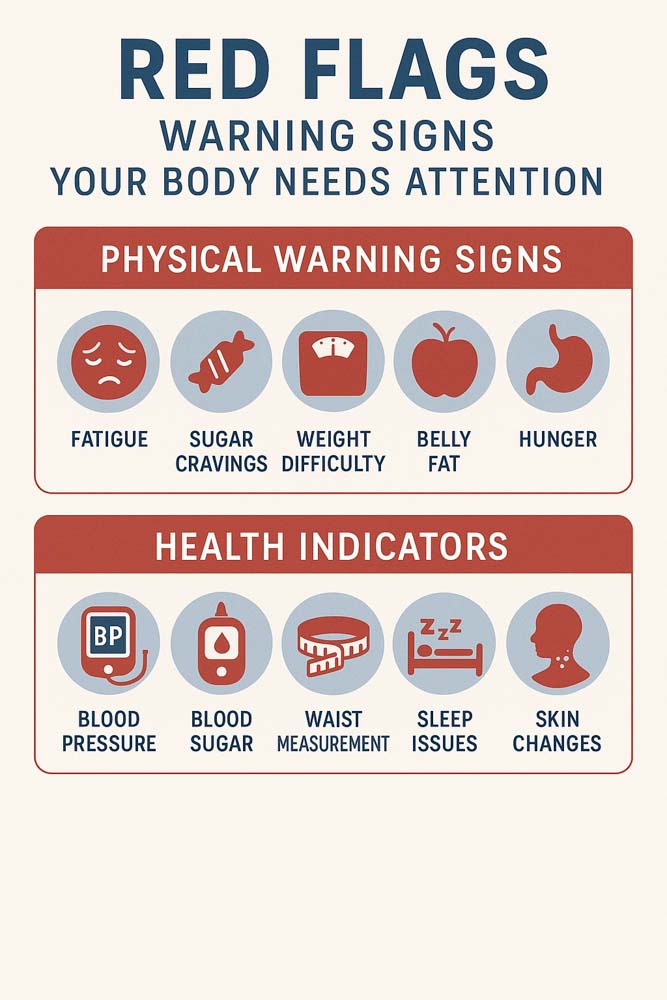
Physical Warning Signs:
- Feeling tired all the time, even after a full night’s sleep (like your phone battery draining quickly)
- Craving sugary foods constantly, especially in the afternoon
- Difficulty losing weight despite eating less and exercising more
- Carrying extra weight around your middle (the “apple shape” Prof. Chan mentions)
- Feeling hungry shortly after eating a meal
Health Indicators to Watch:
- Blood pressure readings consistently above 130/85
- Fasting blood sugar levels above 100 mg/dL
- Waist circumference over 35 inches for women or 40 inches for men
- Difficulty sleeping or frequent snoring
- Skin tags or dark patches on the neck or underarms
Prof. Chan explains that these signs often appear years before serious conditions like diabetes or heart disease develop. It’s like seeing storm clouds before the rain starts – you have time to take shelter if you pay attention to the warning signs.
Prof. Mike Chan’s 7-Day Quick Start Guide
Based on the principles in his book, Prof. Chan offers this simple week-long plan to jumpstart your journey to better health. Think of it as a gentle introduction to a healthier lifestyle, like dipping your toes in the water before diving into the pool.
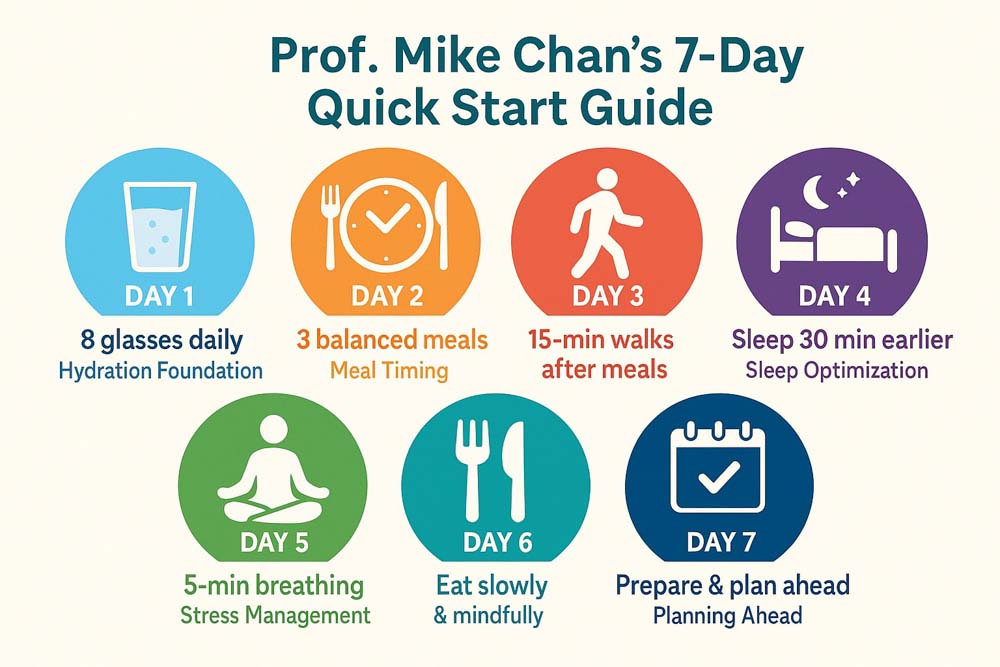
Day 1 – Hydration Foundation Start your day with a large glass of water before coffee or tea. Aim for 8 glasses throughout the day. Prof. Chan explains that proper hydration is like oil for your body’s engine – everything works better when you’re well-hydrated.
Day 2 – Meal Timing Eat three balanced meals without snacking between them. This gives your digestive system time to rest, like letting your washing machine complete its full cycle before adding more clothes.
Day 3 – Movement Matters Take a 15-minute walk after each meal. Prof. Chan says this simple habit can significantly improve how your body processes food, like stirring a pot to prevent ingredients from sticking.
Day 4 – Sleep Optimization Go to bed 30 minutes earlier than usual and avoid screens for one hour before bedtime. Quality sleep is when your body repairs itself, like a construction crew working overnight.
Day 5 – Stress Management Practice 5 minutes of deep breathing or meditation. Chronic stress disrupts your metabolism, like having your car alarm constantly going off and draining the battery.
Day 6 – Mindful Eating Eat slowly and chew each bite thoroughly. Put your fork down between bites. This helps your brain recognize when you’re full, like giving your stomach time to send a “full tank” signal to your brain.
Day 7 – Planning Ahead Prepare healthy snacks and plan tomorrow’s meals. Prof. Chan emphasizes that preparation is key to success, like having a roadmap before starting a journey.
Simple Meal Planning from Prof. Mike Chan’s Approach
Prof. Mike Chan’s dietary recommendations focus on foods that support your body’s natural healing processes. Here are some simple meal ideas that anyone can prepare:
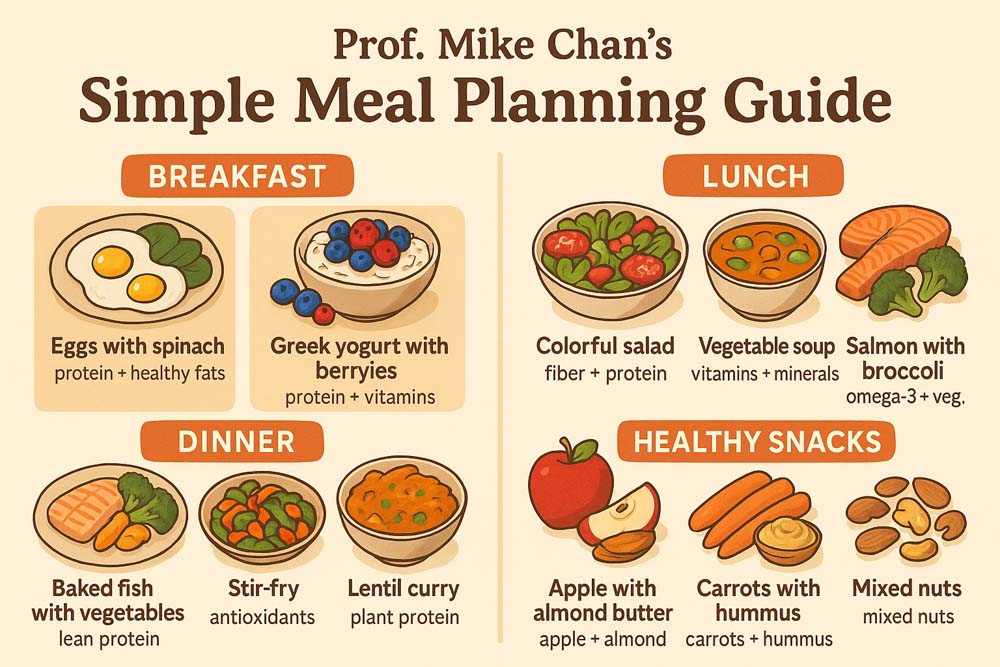
Breakfast Options:
- Two eggs with spinach and avocado (protein and healthy fats to start your engine)
- Greek yogurt with berries and a handful of nuts (probiotics for gut health)
- Oatmeal with cinnamon and apple slices (fiber to keep you satisfied)
Lunch Ideas:
- Grilled chicken salad with olive oil dressing (lean protein with anti-inflammatory fats)
- Vegetable soup with beans (fiber and plant-based protein)
- Salmon with steamed broccoli (omega-3 fatty acids for brain and heart health)
Dinner Suggestions:
- Baked fish with roasted vegetables (easy to digest and nutrient-dense)
- Stir-fried vegetables with tofu or lean meat (quick and customizable)
- Lentil curry with brown rice (plant-based protein and complex carbohydrates)
Prof. Mike Chan’s Snack Rules: If you must snack, choose combinations that include protein and fiber: apple slices with almond butter, carrots with hummus, or a small handful of mixed nuts. Think of snacks as small fuel stops rather than entertainment.

To learn more about Prof. Mike Chan’s work and his new book, you can visit: https://european-wellness.eu/publications/obesity-and-metabolic-syndrome/
Follow European Wellness Academy:
